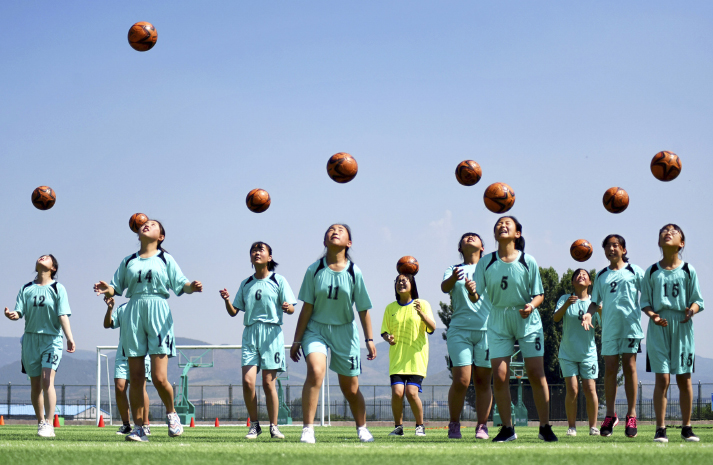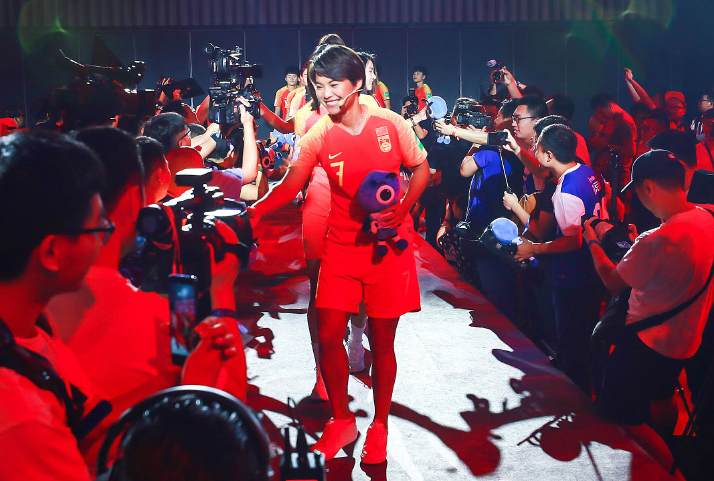|
||||||||||
| Home Nation World Business Opinion Lifestyle ChinAfrica Multimedia Columnists Documents Special Reports |
|
||||||||||
| Home Nation World Business Opinion Lifestyle ChinAfrica Multimedia Columnists Documents Special Reports |
| ChinAfrica |
| Eye on the Ball |
| China makes greater efforts to reform women's football |
| By Xia Yuanyuan | VOL.11 August ·2019-08-12 |

Girls practices football in Xili Primary school in Shandong Province (XINHUA)
There is a football revolution going on high up in the mountainous area of northwest China's Gansu Province - and it has a decidedly female flair. The sturdy legs racing around the pitch of Zhonglianchuan Primary School belong to a group of girls passionate about the world's most popular sport.
Though the school is not well equipped to play football, the girls are encouraged to try their best at the school team and training takes place with a marked air of professionalism.
The girls use their spare time to train, however, it is no easy task for young football players to perform well both on the field and in the classroom. Despite the challenges, many of the girls achieve both.
At present, six players from the school are enrolled with full scholarships from the Evergrande Football School in Qingyuan in south China's Guangdong Province. Established in 2012, the 68-hectare campus is the world's largest football school and offers pupils full-time schooling alongside training from world-class coaches.
"Football is my dream, and I can pursue my dream here. It can take me out of this poor mountainous area," said Du Qian, a student in the school, who came from Gansu Province.
Glory days
In China, football can't be counted as a popular sport among women. Though the Chinese women's national football team has traditionally been more competitive on the international stage than the men's side, the women achieve far more with far less support, and professional women's football in China gets little attention and plays to small crowds.
This year, at the FIFA Women's World Cup held from June 7 to July 7 in France, Chinese Women's National Football Team reached the last 16 where they lost 0-2 to Italy. Though not the desired result, the team boasts an achievement that the Chinese men's team can only envy, as men have qualified for the FIFA World Cup only once in 2002.
"We all produced a good performance and showed our spirit, but we lacked power going forward," playmaker Wang Shuang said after the loss.
In China, the female footballers were given the nickname Steel Roses to praise their tenacious spirit.
"Chinese women's football enjoyed its glory days back in the 1980s and the 1990s, and that's because we had a really early start in the sport," said Chen Guoqiang, an associate professor at the Shanghai University of Sport.
"Now, many other countries have started to focus on the women's game - especially some European countries that boast a strong tradition in the men's game and professional leagues," said Chen, adding that the Steel Roses are growing, but not fast enough compared with others. "We have to accept and recognize the position of our team in Asia and the world. They need some time [to develop]."

Chinese famous football player Wang Shuang (center) attends the sponsorship ceremony launched by Alipay, which unveils a $145-million initiative to support development of women's football in China (XINHUA)
Challenges ahead
There are still many challenges facing China's women football, which can be traced back to youth training.
In China, fewer parents are willing to send their daughters to football schools. Also, Chinese girls perhaps do not have many opportunities to get into the sport at school. Physical education classes are often substituted for other courses.
"Girls in ordinary schools seldom play football because they have too many [extra-curricular] choices, such as playing musical instruments and singing, and they usually prefer table tennis and swimming if they engage in sports," Wang Jianxiang, a physical education teacher in a middle school in Beijing, told ChinAfrica. "Even if some girls like football and want to join a football team, they have to ask for their parents' permission. In most cases, the answer is no."
Even in schools with football teams, the coaches themselves are not professional enough. Also, there are not enough quality matches for all levels of the women's game. "Some university teams may train for a whole year, and only have one tournament to play," said Wang Jianding, a football coach from Shaanxi Province.
Another factor to take into account is that China's rapid economic growth drives the development of sports in a market-oriented manner. The more eye-catching men's football, showcased by the superstar-studded Chinese Super League (CSL), has helped create many millionaires.
However, women footballers in China still lead a relatively poor life. The domestic women's events always face the embarrassment of lack of funds. Many of the junior players suffer from a lack of income, and they also have to pay their own traveling fees to away games.
"For a junior football team, after several years' training, only three or four players can enter a provincial team and maybe none of them can enter the national team," said Xi Dingying, a former player for the Chinese Women's National Football Team.
According to her, these players who cannot continue their football dreams have to find a way out by themselves. "But they have no other skills with which to make a living because of the long-term training. That's why parents do not want girls to play football in schools," she said.
Increased sponsorship
To encourage more girls to put on their football boots and take up the sport as a career option, while at the same time attracting more public support for the female sides, the Chinese Government and the big businesses have combined forces in recent years. One example of their collaboration is the investment made in July by the Chinese payment and service platform giant Alipay to input 1 billion yuan ($145 million) over the next decade to develop women's football in China. The amount is the biggest sponsorship of women's sport in China in history.
Backed primarily by the Alipay Foundation, the funds will be allocated across four main areas: improvement of the training of the Chinese Women's National Football Team; injury prevention and treatment, and career development of retired footballers; technical development and coach education; and youth development.
Supporting a dream
To stop the descending arc of Chinese women's football, the country is making steady progress in its football reform and development plan. This year, a new policy has been unveiled by the Chinese Football Association (CFA) which is aimed at further developing the women's game for the foreseeable future and beyond.
According to the new policy, all clubs of the CSL are required to have their women's teams established by 2020. These newly-founded teams will compete in the Women's Super League and other divisions. Annual investment in each women's team must fall within a 15-30 million yuan ($2.2-4.4 million) limit.
"At grassroots level, CFA has negotiated with the U.S. to establish an international youth training center for women's football, and the reason why we chose to open the center in the U.S. is because of the Americans' advanced experience in women's football development, especially at university level," said Du Zhaocai, Deputy Minister of the General Administration of Sport of China.
(Comments to xyy@chinafrica.cn)
|
||||||||||||
| About Us | Contact Us | Advertise with Us | Subscribe |
| Copyright Beijing Review All rights reserved 京ICP备08005356号-5 京公网安备110102005860号 |